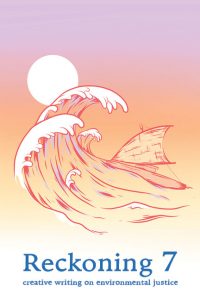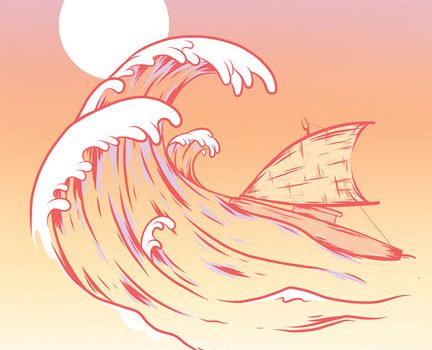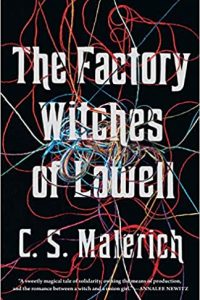Charles Payseur Reviews Short Fiction: Reckoning, Fusion Fragment, Drabblecast, and Strange Horizons
 Reckoning 1/23
Reckoning 1/23
Fusion Fragment 1/23
Drabblecast 1-2/23
Strange Horizons 1/16/23, 1/23/23, 1/30/23, 2/6/23, 2/13/23
Reckoning released a new issue in January, which means a whole new year’s worth of non-fiction, poetry, and stories. It starts strongly with Nadine Aurora Tabing’s “The Bright in the Gyre”, which features Cora as a scientist working on a project to create special mushrooms that can break down plastic pollution and recycle it into food. When her project is stalled by capitalist bureaucracy, though, and her own deteriorating health – a result of eating fish polluted with microplastics – forces her to confront her own mortality, she finds hope in an unexpected place. Gyre is a community living on the Great Pacific garbage patch, seeking to tackle pollution head on. It’s seemingly futile work, and yet it’s also real, tangible, and just what Cora wants, and Tabing does wonderful work in revealing Cora’s journey as a scientist, as an activist, and as a person suffering something that mirrors the damage that’s been done to the planet. And there’s a living hope to the piece found in direct action, in defiance of science that has been corrupted by money, and in communities of people coming together to do good work.
Rajiv Moté continues with the mix of damage and hope in “The Air Will Catch Us”, which finds a grandmother escorting her grandchild to a playground. For all it’s a familiar scene, the worldbuilding reveals the extent to which humans damaged the world, and how they’re also working to heal it. For the grandmother, the ease with which the younger generations trust the world and their place in it is strange, having lived so long with a guilt and almost paranoid doubt that safety and harmony could be possible. But Moté shows how contagious hope and trust can be, and how it’s a necessary starting point for true generational change for the better. Aparna Paul shifts the scope and scale of devastation and hope to a more personal and intimate level in “Little Apocalypses”, though the focus is still very much on family and generations. The story follows a mother and daughter and their yearly tradition on the fall equinox to remember and to tell stories about the end of the world. At least, the mother tells the story, and the daughter listens, sometimes refuses to listen, but comes in time to realize the power and importance of this ritual. The title implies the truth and lie of “little” devastations and losses, endings that make personal the full weight of time and beauty of each life. Paul’s prose resounds with warmth and power, showing that worlds end, and stories change, but there are new worlds, and new storytellers to carry on.
Moving to the issue’s poetry, Ivy Raff traces loss, destruction, and the passing of a glacier that leaves so much in its wake in “In Memory of Thwaites Glacier”. The piece looks at the irreplaceable beauty and importance of a part of the world that can disappear entirely, that can melt and leave little enough to mark what it was and what it meant. Raff constructs the poem cleverly, with dense stanzas like packed ice which, if they came loose, if they melted, would lose any meaning in their words, would stop being the poem as it is, would leave only orphaned words and letters floating across the page. Micah Nemerever also looks at change and loss in “P-T”, which traces the species, ecosystems, histories, and peoples we are losing to climate change, pollution, and exploitation. The piece confronts the idea that we are in a slow decline, where war and other human influences are robbing the world of its wonders and health. It’s not a piece about futility, though, and it holds to the idea that people will try to save what they can, to fight as hard as they can, and might yet right the ship, might yet come out the other side in balance with nature. But that, regardless, there will be less flowers than now, than before, and that’s a weight that will always need to be carried forward. “Great Barrier Reef” by Justine Norton-Kertson similarly is about loss and renewal, time and change. It finds a narrator who meets themself at a reef, their past and future selves facing something beautiful and also the prospect of its destruction. The reef itself becomes a message, a vehicle for that time travel, as they try to warn and admonish themself, as they wonder if more could have been done and prepare to try to do more regardless. It’s a piece full of mourning but also resolve – an important combination for facing ecological loss and activism.
Fusion Fragment changed things up a bit for their January issue, focusing on novelettes, including Vanessa Fogg’s wonderful “How to Travel Safely in Faerieland”. Following the death of her parents and a tumultuous and isolated couple of years, Jill sees an online video of an enchanting Faerie dance and feels it’s time to travel to Faerieland, even if restrictions in the United States to go there are getting harsher. She joins a guided tour, controlled because of the danger involved and sold as safe despite the reality of what and who the Faerie are. It’s not safety she’s after, though, and Fogg explores loneliness and desire as Jill finds her place in the tour group and in Faerieland while also finding a growing distance between her and the life she’s taking a break from. That the promise of this new place is laced with danger and an almost predatory magic doesn’t change the connection she feels, and she might just be willing to risk a life she’s not sure she ever really fit into for a chance to be free in ways impossible in the human realms.
January brought a new flash fiction episode of Drabblecast, with three rather interesting stories, while February returned to short story length work with Bob McHugh’s clever take on the “one always lies and one always tells the truth” riddle in “Is This a Plate?” In it, the narrator is a hero who defeats the villain and ends up in a relationship with one half of the famous riddle. But is it the guard who always lies, or is it the guard who always tells the truth? Neither the narrator nor the guard are very keen on revealing the truth, preferring instead a game of trust and play, their relationship deepening because of rather than despite the lack of a definite answer. McHugh plays with cliché and expectations, leaving readers to either scour the text for “clues” or decide to play along, enjoying the ambiguity and charm and magic of the characters and setting rather than getting bogged down in rules and objective “knowledge.” It’s a lot of fun.
The last three weeks of Strange Horizons’s January were focused on non-fiction and poetry, including Anna Cates’s “The Witch of Pig Island”, which explores perceptions and prejudices that surround a witch who for some is a monster. For others, though, she is an inspiration, a brave hero standing against injustice and the harsh regards of those around her. As the poem reveals, though, she is tired, burned out, broken in some ways because of the pressures and the hate and everything that makes being who she is complicated. Cates shows that underneath the rumors and the fear there is a human, hurting, and it’s a powerful and moving statement. The final issue of January was a special issue focused on criticism and reviewing and a tribute to former (and sadly passed) non-fiction editor, Maureen Kincaid Speller. And it’s with Speller’s own words and reviews that Romie Stott created “In Review”, a poem in snippets and quotes. Carefully and artfully constructed, the tribute is meditative, wandering but never lost, always returning to the act of interpretation and engaging with texts in wonder, joy, and intention. It’s a beautiful and touching work.
Moving into February, Anya Markov tells a story of resistance, identity, and friendship with “Fire and Ice”, in which Smaug and Sasha are two queer people growing up in a Russia that is deeply unsafe for them. And they face the danger their identities present in different ways, helping each other survive until time and circumstance put them on different roads, continents apart. They find each other again, though, as protests mount and change seems possible, though it might take their combined fury and logic, fire and ice, in order to make the dream of change more than a cindered massacre. It’s a defiant and triumphant read. And R.B. Lemberg provides a poem that I can feel in my bones with “Iron Burns Out”, which focuses on the push and pull of needing it to be okay to rest and it absolutely not being okay in general. Because as necessary as self-care and rest are, the injustices and needs of the world can make them impossible. Does that make the work of pushing for justice, of trying to protect and help others, of pushing back against the crushing weight of corruption and hate…futile? Definitely not, but there is also only so much a person can give, and often people do just that, burning away in the attempt to shield others. Lemberg confronts the mythical balance of individual effort and systemic corruption, to sharp and shattering result.
Recommended Stories:
“The Bright in the Gyre”, Nadine Aurora Tabing (Reckoning 1/23)
“Is This a Plate?”, Bob McHugh (Drabblecast 2/23)
“Fire and Ice”, Anya Markov (Strange Horizons 2/23)
Charles Payseur is an avid reader, writer, and reviewer of speculative fiction. His works have appeared in The Best American Science Fiction and Fantasy, Lightspeed Magazine, and Beneath Ceaseless Skies, among others, and many are included in his debut collection, The Burning Day and Other Strange Stories (Lethe Press 2021). He is the series editor of We’re Here: The Best Queer Speculative Fiction (Neon Hemlock Press) and a multiple-time Hugo and Ignyte Award finalist for his work at Quick Sip Reviews. When not drunkenly discussing Goosebumps, X-Men comic books, and his cats on his Patreon (/quicksipreviews) and Twitter (@ClowderofTwo), he can probably found raising a beer with his husband, Matt, in their home in Eau Claire, Wisconsin.
This review and more like it in the April 2023 issue of Locus.
 While you are here, please take a moment to support Locus with a one-time or recurring donation. We rely on reader donations to keep the magazine and site going, and would like to keep the site paywall free, but WE NEED YOUR FINANCIAL SUPPORT to continue quality coverage of the science fiction and fantasy field.
While you are here, please take a moment to support Locus with a one-time or recurring donation. We rely on reader donations to keep the magazine and site going, and would like to keep the site paywall free, but WE NEED YOUR FINANCIAL SUPPORT to continue quality coverage of the science fiction and fantasy field.
©Locus Magazine. Copyrighted material may not be republished without permission of LSFF.







